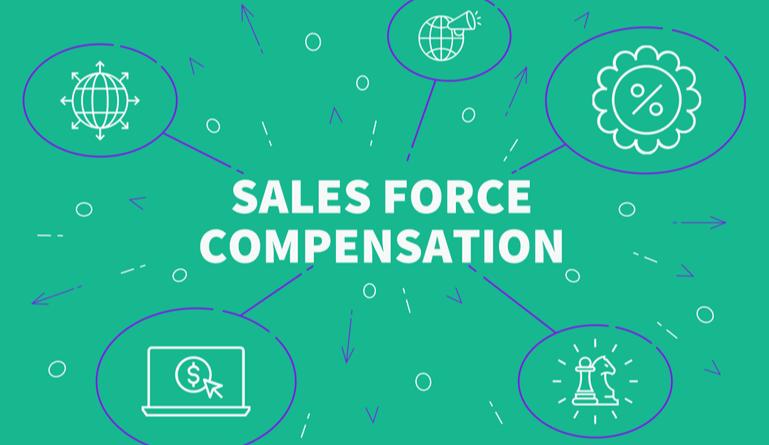Sales compensation is an important factor for the revenue growth of an organization and needs to be re-evaluated from time to time to ensure your top salespeople are motivated to drive organizational success.
Unfortunately, many organizations continue to use outdated programs or worse, compensation plans that are incompatible with their objectives.
An effective sales compensation plan motivates your sales force, increases sales, increases engagement, and reduces turnover (retention).
What is Sales Compensation?
A salesperson’s annual compensation is the amount of money he or she gets paid. Salespeople are typically paid a base salary, a commission, and additional incentives for exceeding their quotas.
For higher-level sales reps and managers, sales compensation programs should encourage high performance.
What is a Sales Compensation Plan?
An outline of how sales reps will be rewarded for their contribution to your business is a sales compensation plan. This is a strategy that can increase your revenue and improve the performance of your sales team.
The earnings report includes every detail of a sales representative’s earnings, including base salary, variable pay, commission, and any other incentives or benefits they qualify for.
Motivating the sales team and encouraging positive behavior while simultaneously establishing compensation expectations and standards are essential here.
The Purpose of Sales Compensation
What is the purpose of incentive compensation? People are motivated by targets. After achieving one, they move on to the next. Compensation plans that have intermediate targets that lead to quotas are most effective.
Targets that are too hard or too easy hinder the performance of sales representatives.
The accelerator targets can be set below quota in two cases, and above quota in one or two cases. Your reps should have a pathway to quota and a goal after reaching quota.
The importance of a good sales compensation plan
Multiple aspects of a solid sales compensation plan (SCP) are crucial. One benefit of the compensation plan is that it provides incentives for your sales team members to achieve your goals. Most companies and their sales teams benefit from the most productive employees, creating a win-win situation.
Your company will attract high-quality talent with lucrative sales compensation plans. Your sales compensation plans should reflect the importance of sales to your business.
Top performers naturally desire jobs that reward them for their skills and efforts. Compare your SCP to your competitors if you have had trouble attracting top talent in the past.
In addition, successful sales representatives and executives are often looking for greener pastures. Good sales compensation plans can help retain top performers by ensuring they receive the best deal.
If your sales department has an unnaturally high turnover rate, your sales compensation plan may need to be reviewed.
In addition to boosting teamwork, a good sales compensation plan can be beneficial. Team-based compensation creates a collaborative and synergistic environment.
Salespeople will be more likely to share tips and best practices in such an environment since they have a common goal. If you do this, your sales department will be able to increase revenue from team members who previously performed poorly on their own.
5 Steps to an Effective Sales Compensation Plan
-
Establish your payment targets and strategies
Determine the median income of the market. Your industry and location may influence this figure.
Additionally, commissions must be taken into consideration when determining your salary target. As the foundation of the structure of your compensation plan, you must carefully choose your target pay.
-
Choose your sales compensation plan
Decide on the compensation system you will use. This could be straight pay or a base income with commission plans.
Based on your new hires’ roles and expected results, you should create a sales compensation plan.
You might want to pay sales agents a base salary plus commissions since they close deals. If you’re hiring a sales manager, you can either offer a high salary or a significant base salary combined with sales commission plans.
-
Include all team members
As you establish sales compensation plans, you should not just focus on reps when it comes to commission structure templates. Your pay package template must include a system of sales commissions for all salespeople to promote motivation and equality.
Explain how the sales bonus structure works and when employees are paid commissions by using a commission schedule form.
-
Use the metric system
Measurable compensation programs are the best. As a result, your KPIs should be tied to the synchronization of sales made by representatives and the rewards offered.
Among the most common measures are:
- Sales growth rate
- Profit margin
- Potential customers became engaged in the sales process
- Estimates
- The market penetration rate
- Closed sales for each rep
- The average lifetime value of an agreement by size
- Demonstration and onboarding rates
- Conversion and prospecting time for leads
CRM solutions allow you to keep track of key performance indicators (KPIs) that include sales growth and successfully closed deals.
-
Set targets and quotas
Following the establishment of quotas and milestones, the sales manager will be able to evaluate performance and communicate data. This will enable him to keep track of salespeople’s progress toward key objectives.
Additionally, you can use resources to better understand how to build up sales quotas. An alternative is the Reps Activity-Based Sales Model, also called Activity-Based Selling. It assumes that sales are the result of a series of predetermined activities rather than quotas.
An Example of a Sales Compensation Plan
If you implement a pay model that compensates both top and underperformers equally, your churn rate will be high. Selling something will cost you money.
The percentage is calculated by taking a salesperson’s base salary, plus commissions received at 100% of quota, and bonus chances, and dividing it by their earnings.
A salary-only plan in the case of a rep indicates that the company will pay its personnel based on their hourly rate or yearly salary without commissions.
Furthermore, this type of plan may seem like it would motivate employees to work harder, but it will do the opposite of what it is supposed to do. Lower pay will discourage salespeople from selling.
Final Thoughts
Having a well-designed sales compensation plan can attract the best and brightest talent in the industry. You can choose one or more of the structures above for your sales commission plan.
Your priorities will constantly change, your sales reps will always seek new loopholes, and your prospects will periodically change their preferences. So, no sales compensation plan is flawless.






